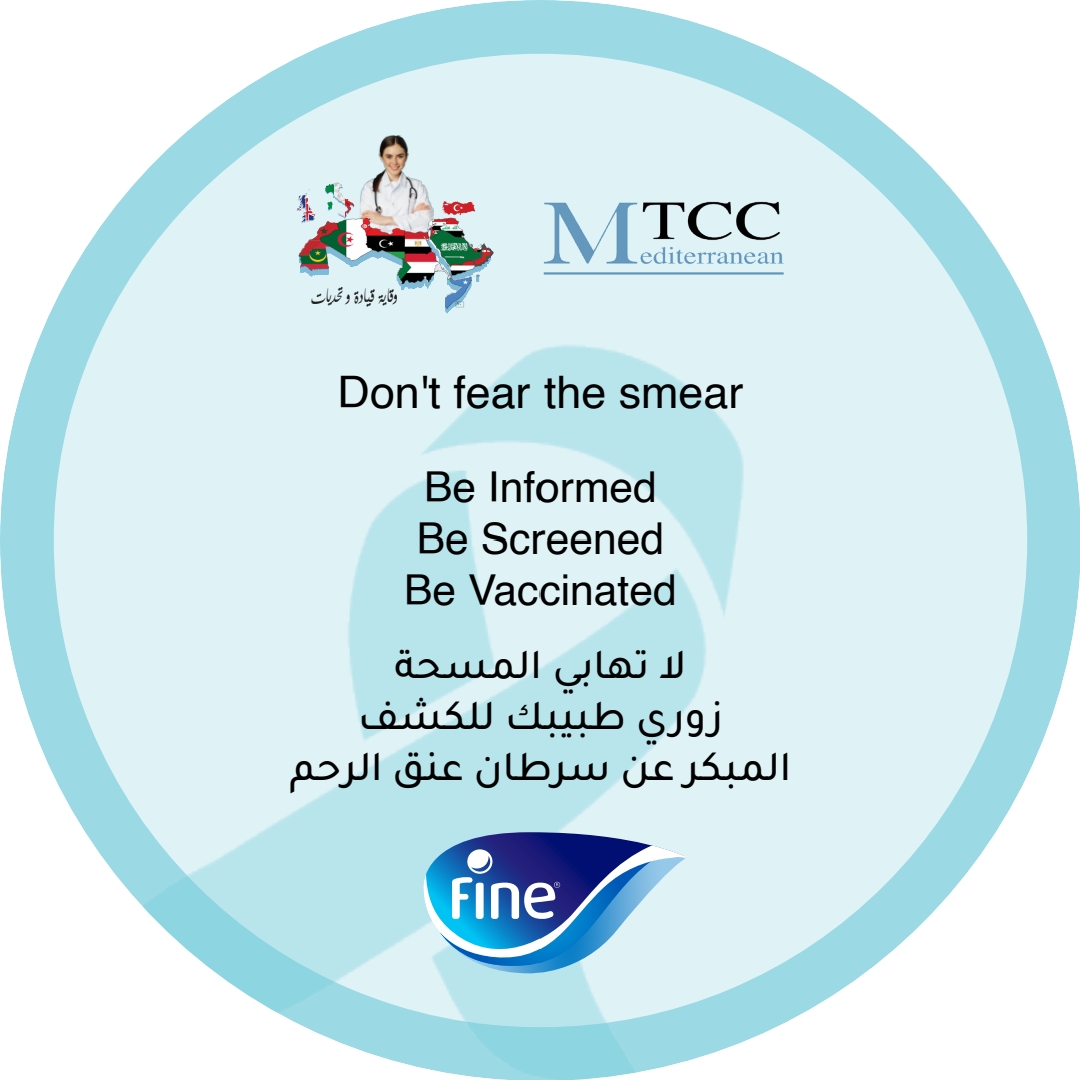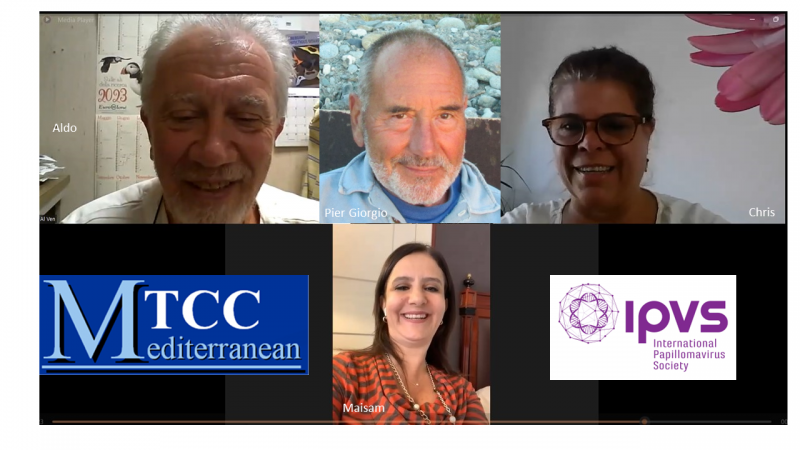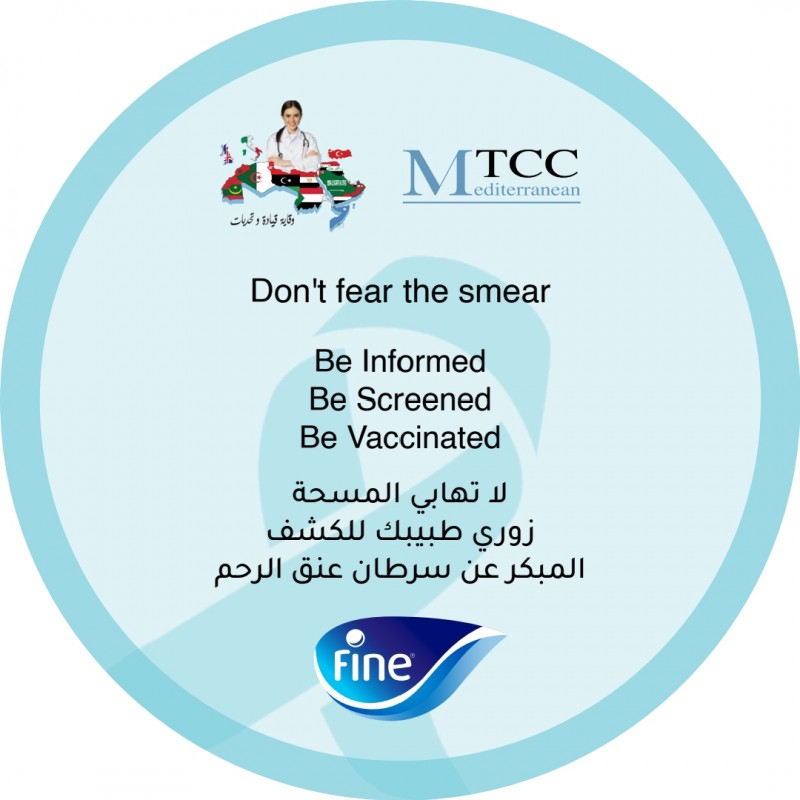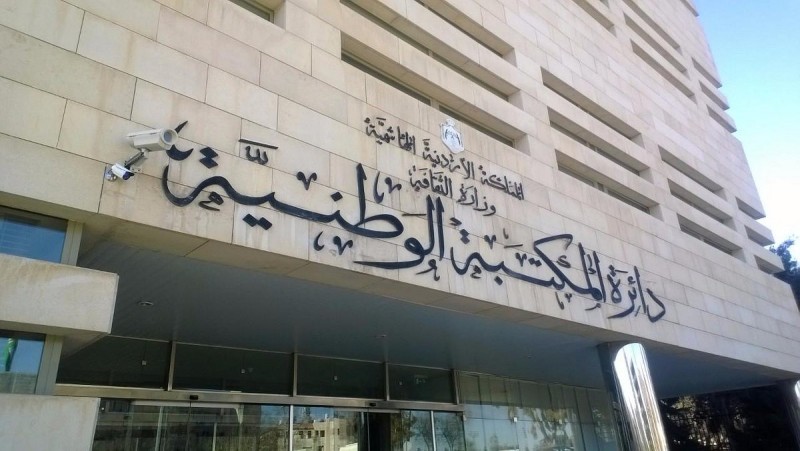Vcan-HPV: Japanese medical students inform young people about HPV
Let’s PreVent CANcer


In Jordan, HPV Awareness Day took place on June 6th. The team of organizers* came up with an innovative way to raise awareness about how to prevent cervical cancer:
Why not put a sticker with an important health message for women on the box of the sanitary pads?
IPVS had the opportunity to speak with several members of the event organizing team (MTCC Vice-President Dr. Maisam Akroush, Prof. Aldo Venuti, of IRCCS Regina Elena National Cancer Institute and IPVS member, and MTCC Secretary-General Prof. Pier Giorgio Natali), so we could hear more about it.
Q: Where did the idea to put a message sticker on the box of sanitary pads come from?
Aldo
Pier Giorgio and I like to brainstorm to come up with ideas to raise awareness of HPV because we feel that educating the public on health risks that can be easily prevented is so important. In this activity within MTCC, we have been partnering with LILT (Italian League Against Tumors - Rome Chapter), and with the Federico Calabresi Foundation (both of which are also partners of the IHAD Campaign).
The HPV vaccine became available in 2006, making it one of the more recent relevant advancements in public health. Today, 17 years later, an array of information policies is still urgently needed to raise awareness and understanding of HPV among various target audiences in the general public. However, prevention messages are particularly challenging to deliver effectively; how does one grab people’s attention?
We decided to try something similar to what is done on tobacco packaging (and may be adopted for alcoholic beverages); let’s use the box of female hygiene products like sanitary pads as a vehicle for sharing positive messages with women about cervical cancer prevention.
Q: How did you find a manufacturer of sanitary pads to work with?
Maisam
Like most things in life, it helps to know people. When Pier Giorgio suggested the idea of putting a message sticker on the sanitary pad box, I realized that I have contacts at a leading company in Jordan that makes these products. I spoke with representatives there, and they quickly produced a sample of 220 boxes with stickers to share with attendees at the workshop we organized on HPV Awareness Day in Jordan - June 6th. It made quite an impression on the gynecologists and other healthcare professionals at the meeting.
However, such stickers presented practical issues for mass production. Unless the product package is redesigned (which is a lot to ask of a manufacturer), a sticker will cover up other messages (some of which are mandatory). The solution we came up with is to put a point-of-sale sign with the same message on the shelves everywhere their products are sold. So that’s what this company will do! In every supermarket and pharmacy throughout the country where their products are available, there will be a sign on the shelf saying: ‘Be informed. Be Screened. Be vaccinated. Don’t’ fear the smear.’ We think this is a good step forward. The signs are nearly ready, we are just finalizing the appropriate positioning of logos to keep a distinction between academic interests and commercial involvement.
We also thought of a related messaging vehicle - to create stickers on the packaging of the large sanitary pads that are given for free to mothers who have just given birth in hospital. We plan to produce several thousand of these pads and distribute them to maternity units in hospitals around the country.
Q: About the wording of the message: screening gets mentioned before vaccination, why? And HPV is not specifically mentioned, was that intentional?

Maisam
The culture in Jordan is conservative. It was very important that all of the respected national institutions like the Royal Medical Services and the Ministry of Health should feel completely comfortable with the wording of the message. We decided to simplify the message to just ‘Get Vaccinated’ to prevent cervical cancer.
Screening is mentioned first because it is more of a focus in Jordan than vaccination. Currently the price of the HPV vaccine is very high, around $250, making it cost-prohibitive for many women. And it is not a priority to be included in the national immunization program.
When it comes to communicating with adolescents at school, HPV vaccination is included in a general ‘healthy lifestyles’ program approved by the Ministry of Education. The program covers topics like preventing cancer, obesity, and substance abuse as well as behavioral issues like discouraging bullying. It has become very popular at many secondary schools.
Aldo
I agree with the decision to omit the word ‘HPV’ from the message. Looking back to when the HPV vaccine first became available, messages toward the public focused on preventing a sexually transmitted virus called HPV. Mentioning sex in combination with recommendations to vaccinate at a very young age generated concern from many parents in many cultures. Things have changed. Now we have proven that the HPV vaccine prevents cancer. This is a much easier message to convey without offending anyone. People of all ages can favorably receive this message. We have a vaccine against cancer.
Another thing about the way this message is formulated – perhaps it generates curiosity; Be informed about what?
Q: Tell us about the evening program on June 6th: “Raising awareness on Cervical Cancer: Do not fear the Smear”. Who were you targeting?

Maisam
The event took place on June 6th in the National Library of Jordan, a well-known and respected venue. We invited the leaders of relevant medical societies to do their part to improve the level of cervical screening in our country. A range of healthcare providers were present: general practitioners, family physicians, gynecologists, and oncologists. Our speakers included highly esteemed medical experts from the Army Royal Medical Services and the private sector. Chaired by the WHO representative for Jordan (who is also the President of the Society of Family Physicians), the Head of the Epidemiology Department at the Jordanian Ministry of Health, and the Heads of the societies of Gynecology and Oncology, it was inspiring to have so many national leaders gathered together behind this cause.
The Jordanian government has recently approved the establishment of the Pan-Arab Women Physicians Association, the first such organization in the Arab world. This will become a fantastic collaboration of female doctors across many medical disciplines. I hope to be able to emphasize the “Don’t fear the Smear’ message sticker initiative and cervical cancer prevention at an upcoming conference in the Emirates.
Q: Can you share your thoughts about addressing the ‘fear’ of getting screened?
Maisam
Our health is the most precious thing we have. Getting screened opens up the possibility of discovering that something is not quite right, and further attention is needed. That can feel scary, when in fact the sooner doctors know what the situation is, the greater the chance is of putting it right.
Perhaps a woman assumes that going for the next scheduled screening is unnecessary because earlier results were clear. This is flawed thinking; the past does not predict the future.
Maybe there is simply a lack of awareness of how important cervical screening is for early detection of abnormal or pre-cancerous cells, which can be treated before cancer develops.
Let me say it this way: Cervical screening can save your life.
Q: Is access to cervical screening and treatment sufficient in Jordan if all those eligible for screening should decide to do it?
Maisam
Yes, cervical screening and treatment are available to women here. Of course, it’s easier in urban settings. To reach women who live in more remote areas, public health services and local healthcare providers have a plan to deploy mobile labs with a trained pathologist to provide ‘screen and treat’ solutions. The mobile labs will pass through these areas once a week on average. This will improve the level of early detection, which is crucial. Cancer treatment is financially supported by the Jordanian government.
Q: Do you think there is a role for men to support the women in their lives to take action to prevent developing cervical cancer?
Aldo & Pier Giorgio
HPV diseases are not confined to women. Men need to be made aware that HPV presents risk of cancer for them as well. For example, HPV-related oropharyngeal cancer (cancer of the head, throat, and neck) occurs more often in men than in women. Men should learn about the topic and take action to protect their health and the health of the women in their lives. We need their involvement in accelerating the elimination of cervical cancer – an exciting, first-time occurrence!
Q: Do you have advice for other HPV awareness advocates who want to launch similar campaigns in their countries?
Aldo
If you mean trying to replicate the ‘message sticker’ on sanitary pad packages, general advice is hard to offer because every situation is so different. In Jordan, it was Maisam’s personal connection with people working for the company manufacturing this product that made all the difference. However, MTCC members in other countries in the region know about this initiative, and we hope to see similar initiatives spring up elsewhere.
Maisam
When there is an opportunity to prevent disease, we need to influence the attitudes of both healthcare providers as well as patients. It’s not always easy to change systems, but with effort, we can change the mentality of people. Late diagnosis of cervical cancer leads to deaths that can be prevented. Even one death is one mother, wife, daughter, or sister too many.
Pier Giorgio
At MTCC, we encourage to explore new HPV awareness strategies. if it’s not this, try something else. Visit schools. Raising awareness and stimulating people to take action to protect their health through vaccination, screening, and timely treatment, literally saves lives. Every action, big or small, is always superior to the devastating effect of inaction.
*Organizing Team behind the HPV Awareness Day in Jordan: MTCC Vice President Dr. Maisam Akroush in collaboration with: Royal Medical Services, Pan Arab Women Physicians, Gynecological/Obstetrical Society, MOH Epidemiology Dept, Jordan Oncology Society, Family Doctors Society, with support from the IRCCS Regina Elena National Cancer Institute.
About MTCC:
The Mediterranean Task Force for Cancer Control (MTCC) is a federation of university and institutional bodies, scientific societies, foundations, and collaborating partners that have banded together to reduce cancer-related suffering and mortality in their member countries. Established as a non-profit, non-governmental organization in 2004, MTCC aims to influence national institutions and bodies (lawmakers, stakeholders, health officials, voluntary organizations, etc.) to prioritize health policies that enable prevention and early diagnosis of cancer. The current geographical footprint of MTCC spans 24 countries in the Mediterranean region, and the group is open to other countries neighboring their sphere of influence.

Let’s PreVent CANcer

Teenage girl striving to prevent cervical cancer in her country
